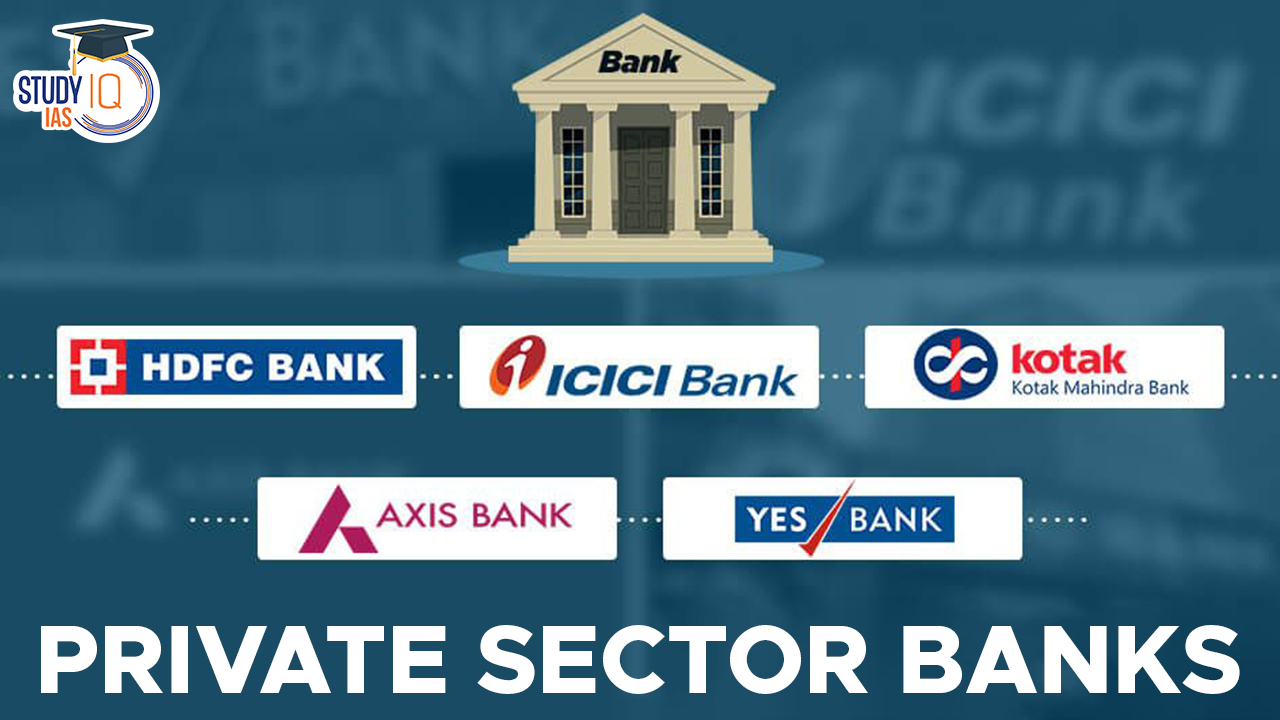Table of Contents
Private Sector Banks
Private Sector Banks are financial institutions that are owned and operated by private individuals or corporations, rather than the government. These banks operate with the objective of making profits for their shareholders. Private Sector Banks play a significant role in the banking sector by offering a wide range of banking and financial services, competing with Public Sector Banks and other private banks. Examples of private sector banks in India include ICICI Bank, HDFC Bank, Axis Bank, Kotak Mahindra Bank, and Yes Bank, among others.
Read about: Banking System in India
Private Sector Banks in India Importance
Private Sector Banks in India have made significant strides since their inception, transforming the banking landscape with their innovative practices and customer-centric approach. Here is an overview of the performance of private sector banks in India, highlighting some landmark events:
Liberalization and Entry of Private Banks (1990s)
- With the liberalization of the Indian economy in the 1990s, private sector banks were allowed to enter the market, breaking the monopoly of public sector banks.
- HDFC Bank, one of the leading private sector banks, was established in 1994, followed by ICICI Bank in 1994-1995.
Technological Advancements and Digital Banking
- Private sector banks were early adopters of technology, revolutionizing banking services in India. They introduced online banking, mobile banking, and innovative digital payment solutions.
- For instance, ICICI Bank launched India’s first Internet banking platform in 1996, setting the stage for digital banking transformation.
Expansion and Network
- Private sector banks expanded their network rapidly, setting up branches and ATMs across the country. They focused on urban and semi-urban areas, aiming for higher profitability.
- HDFC Bank, as of March 2021, operated over 5,608 branches and had more than 16,087 ATMs in India.
Financial Performance
- Private sector banks have consistently delivered strong financial performance. They have reported robust growth in deposits, advances, and profitability over the years.
- For example, in the financial year 2020-2021, HDFC Bank reported a total income of over ₹1.50 lakh crore (around $20 billion) and a net profit of ₹31,116 crore (around $4.2 billion).
Mergers and Acquisitions
- Private sector banks have engaged in mergers and acquisitions to expand their market presence and enhance their capabilities.
- ICICI Bank’s merger with Bank of Madura in 2001 and the acquisition of Bank of Rajasthan by ICICI Bank in 2010 are notable instances of consolidation in the private banking sector.
Regulatory Changes and Governance
- Private sector banks have adhered to regulatory guidelines and adopted good corporate governance practices. They have worked towards strengthening risk management frameworks and compliance standards.
- The Reserve Bank of India (RBI) has implemented various regulations to ensure the stability and transparency of private sector banks.
Read about: List of RBI Governors of India
Private Sector Banks Advantages
Private Sector Banks offer several advantages, including:
Efficiency and Innovation
Private sector banks are often more efficient and agile in their operations compared to public sector banks. According to the Reserve Bank of India, private sector banks had a lower cost-to-income ratio of around 42% in 2020, indicating better operational efficiency.
Technology and Digital Banking
Private sector banks are at the forefront of technological advancements and digital banking services. They have invested heavily in digital platforms, mobile banking apps, and online services, offering customers convenient and user-friendly banking experiences.
Customer Service
Private sector banks generally focus on providing excellent customer service and personalized banking experiences. They strive to understand customer needs and offer tailored solutions, leading to higher customer satisfaction.
Product Innovation
Private sector banks are known for their ability to innovate and introduce new financial products and services. They often bring innovative offerings, such as customized loan products, wealth management solutions, and specialized banking services catering to various customer segments.
Risk Management
Private sector banks typically have robust risk management practices, ensuring the soundness of their operations and minimizing risks. Their focus on risk assessment and mitigation helps maintain a healthy loan portfolio and reduces non-performing assets (NPAs).
It’s important to note that while private sector banks have these advantages, they may also have limitations.
Read about: Types of Banks in India
Private Sector Banks Disadvantages
Private sector banks also have some disadvantages, including:
Higher Interest Rates
Private sector banks often charge higher interest rates on loans and credit products compared to public sector banks. This can make borrowing more expensive for individuals and businesses.
Limited Rural Penetration
Private sector banks tend to focus on urban and semi-urban areas, resulting in limited access to banking services in rural and remote regions. This can hinder financial inclusion and access to banking facilities for rural populations.
Profit-Driven Approach
Private sector banks prioritize profitability and shareholder interests, which can sometimes lead to a focus on high-net-worth individuals and corporate clients. This may result in less emphasis on serving low-income groups and small businesses.
Lower Government Support
Private sector banks do not have the backing of the government, unlike public sector banks. In times of financial crisis, they may face challenges in obtaining government support and bailouts.
Concentration of Power
In some cases, private sector banks may become dominant players in the market, leading to concerns about the concentration of power and potentially anti-competitive practices.
Read about: Indian Financial System
Private Sector Banks UPSC
Private sector banks are an essential topic in the UPSC Syllabus, particularly in areas like economics, governance, and banking sector reforms. Understanding the functioning and significance of private sector banks is crucial for aspirants preparing for the UPSC exam. To enhance their knowledge, candidates can avail themselves of UPSC Online Coaching that covers the intricacies of private sector banks, along with the UPSC Mock Test to assess their understanding of banking sector reforms and related topics.
Read about: India’s GDP Growth Rate


 Goods and Services Tax (GST), Objectives...
Goods and Services Tax (GST), Objectives...
 World Oceans Day 2025, History, Theme, S...
World Oceans Day 2025, History, Theme, S...
 World Environment Day 2025, Theme, Histo...
World Environment Day 2025, Theme, Histo...





















